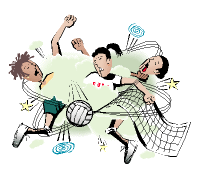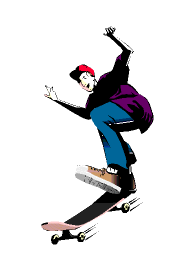

BY BARBARA ANDERSON
Olympic Gold
 UC Davis had its own small contingent at the Centennial Olympic Games in Atlanta this summer (see summer issue, page 42). On their return they reported that these are their most lasting memories:
UC Davis had its own small contingent at the Centennial Olympic Games in Atlanta this summer (see summer issue, page 42). On their return they reported that these are their most lasting memories:
For Dee Vochatzer, coach of the U.S. women's track and field team, and Jack
Snyder, who advised the international corps of veterinarians caring for the more than 250 horses competing in the equestrian events, the outstanding moment was the lighting of the Olympic torch by Muhammed Ali during the games' opening ceremonies. Vochatzer put it well: "Muhammed Ali was an outstanding athlete, who no longer has full control of his body. The strength and courage he demonstrated in lighting that torch said more than any television commentator ever could about what the Olympics
represent."
Gary Colberg, coordinator of the men's and women's volleyball officials, remembers most vividly the post-match scuffle that erupted between the Cuban and Brazilian women's volleyball teams after a hotly contested semi-final match. Emotions ran high on both sides, heightened by the Brazilian fans' taunting of one of the Cuban players and an exchange between player and fans of the universal digital gesture of disrespect. When Cuba ultimately won the match, the Brazilian team, rather than shaking hands with the Cubans under the net as is customary, opted instead to pull the shirts of the Cubans' uniforms. Chaos spread to the benches, then to the locker room, where it was finally subdued. Colberg said the intensity of all the female athletes at the games was very evident--yet another demonstration, he said, that as far as the Olympics are concerned, "women have come into their own."
Warm and fuzzy logic
Scientific American's Web site features asection called "Ask the Experts," in which scientists from various disciplines respond to questions submitted by the magazine's readers. A recent question about computers and fuzzy logic (a concept used for reasoning about inherently vague concepts, such as "tallness") was answered directly by several experts, but the Web site also mentioned the approach of Jim Diederich, professor of mathematics at UC Davis, who is investigating the applications of fuzzy logic in biological systems. Diederich tried fuzzy logic techniques on the students in his "Special Topics in Mathematics" class by proposing the following rules for the class:
1. A midterm will be given around mid term.
2. The final will be given around final time.
3. Homework will be assigned fairly regularly.
4. The midterm and final each will normally count as a substantial part of the grade.
5. The homework will not be insignificant in counting as part of the grade.
6. An excellent final will result in a somewhat excellent grade.
7. Solid work in two of the three areas, midterm, final and homework, will result in a solid grade.
8. Good homework will offset poor exams somewhat.
9. Your grade will be a fuzzified linguistic bureaucratic terminological value.
10. If you don't understand this by the end of the quarter, your grade will reflect it.
According to Scientific American, "On homework assignments for this class, Diederich reports that he graded in fuzzy terms: good, somewhat good, very good. His students made him promise that he would provide a numerical grade on the midterm."
Don't worry; be happy
This summer the Office of Summer Sessions sponsored a number of noontime faculty lectures. As part of his talk titled "Who Is Happy, and Why?," in which he discussed the current research in the field of "subjective well-being," or happiness, Robert Emmons, associate professor of psychology, described how people can increase their feelings of well-being:
1. Be active; involve yourself in absorbing activities.
2. Focus outward--on other people, nature or pets, for example.
3. Give priority to relationships; close, intimate relationships are the strongest predictor of happiness.
4. Be present-oriented, not depressed about the past or anxious about the future.
5. Learn to control your inner experience; control your thought processes, finding meaning in the mundane and interpreting problems as challenges.
Or maybe just hang out with a guy named Joe.
Radical, dude!
 Wouldn't you know it: just when the grumbling about the new Social Sciences and Humanities Building had subsided (or perhaps just gone underground), the building's idiosyncratic architecture is taking the rap for another nuisance. Seems that skateboarders and rollerbladers from the local junior and senior high schools are amusing themselves on the ramps, stairs and tops of walls. The building's occupants are somewhat less amused, finding the noise disruptive and the wheel marks ugly, and UC Davis police have taken to discouraging the sidewalk athletes, issuing warnings and the occasional citation. But hey; let's not be too hasty--with budgets still lean, instead of chasing the kids away, maybe we should sell tickets.
Wouldn't you know it: just when the grumbling about the new Social Sciences and Humanities Building had subsided (or perhaps just gone underground), the building's idiosyncratic architecture is taking the rap for another nuisance. Seems that skateboarders and rollerbladers from the local junior and senior high schools are amusing themselves on the ramps, stairs and tops of walls. The building's occupants are somewhat less amused, finding the noise disruptive and the wheel marks ugly, and UC Davis police have taken to discouraging the sidewalk athletes, issuing warnings and the occasional citation. But hey; let's not be too hasty--with budgets still lean, instead of chasing the kids away, maybe we should sell tickets.
PASSING TIME
75 years ago
"Jolly Crowd Enjoys Week-End Social--
The woods along Putah Creek just south of the Farm echoed and re-echoed with the merry peals of laughter from a jolly crowd of young folks last Saturday night. The affair was in the nature of a 'wienie bake' . . . . Things looked rather disconcerting at first to the large crowd of young men assembled, as they outnumbered the Davis girls present about 10 to one. How-ever, soon after arriving at the site selected for the affair on the creek bank, hope was quickly restored. The small but brave little band of Davis 'demoiselles' was gradually reinforced by the arrival of additional fair charmers from Winters, Vacaville, Dixon and other neighboring towns. The local young men, seeing their ranks being so rapidly outnumbered, and unused to the presence of such a large proportion of the fair sex, bashfully retreated and only the announcement that eats were to be served could draw them out of their places of retirement among the tall timbers."
-- University Farm Agricola, Oct. 5, 1921
25 years ago
"Bicyclists Allowed on Hwy 80--Senator Arlen Gregorio, D-San Mateo County, says there is nothing in the law that prohibits cyclists from peddling the 17 miles between Davis and Sacramento on Interstate 80. The possibilities for bicycles on Hwy 80 came out in a discussion of a Gregorio bill calling for the Division of Highways to assure the retention of routes for pedestrians, bicycle riders, horsemen and light motorcycles. Says Gregorio, "Bicyclists are entitled to at least equal treatment with cattle and deer."
-- The California Aggie, Oct. 7, 1971
Illustrations: PAICHING WEI




![]()